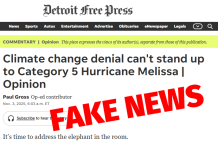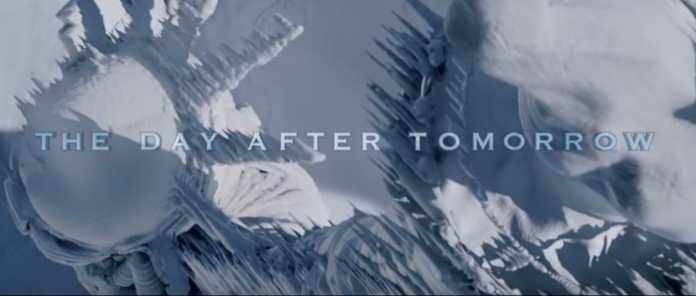BBC has published an article claiming much of the science in the 2004 climate science fiction film The Day After Tomorrow “hold up remarkably well” to historical analysis. Readers who are old enough to remember the movie may recall that the premise of the movie was global warming causing a sudden halt to the Gulf Stream and the North Atlantic Current, resulting in all sorts of sudden and horrifying catastrophes. Yet, the ocean currents have sped up, not slowed down, and the asserted catastrophes have not occurred. Let’s compare climate science versus the BBC’s attempt to Gaslight us into believing absurd climate predictions have come true.
As BBC describes it, “The film starts well, with a climate researcher, Professor Jack Hall (Dennis Quaid), nearly plummeting to his doom in the Antarctic when a mile-long crack splits the ice shelf beneath his feet. Soon afterwards, he explains how the North Atlantic Current works to the US’s skeptical vice president (Kenneth Welsh, a Dick Cheney lookalike).”
Dennis Quaid “explains” to the dolt-like, climate-denier vice president that “global warming is melting the polar ice caps and disrupting this flow [the North Atlantic Current]. Eventually it will shut down. And when that occurs, there goes our warm climate.”
However, climate scientists recently published peer-reviewed data showing the ocean currents are speeding up rather than slowing down. Now, of course, climate alarmists falsely claim global warming speeds up ocean currents and they predicted this all along. Like in the movie Gaslight.
Moreover, BBC admits the movie showed, “Hailstones the size of tennis balls batter Tokyo. Tornadoes rip Los Angeles to pieces. Helicopters fall from the sky when their fuel lines freeze in Scotland. A frighteningly convincing tsunami sloshes through Manhattan, submerging its streets and turning its skyscrapers into islands. New York is then buried under meters of snow and ice.”
Yet, none of these events occurred. None are going to occur. The acclaimed “science” was ridiculous in 2004, remains ridiculous today, and will always be ridiculous.
The only people who will believe BBC’s absurd attempt to try to vindicate climate extremism predictions in The Day After Tomorrow are climate charlatans and people BBC can effectively convince are losing their minds.

























I get heartily sick of hearing the junk science pumped out by the BBC.
Editorially the organisation has been hijacked by what I can only (politely) describe as eco-activists. Any sembance of balanced reporting on science long since disappeared, giving the message is all that counts regardless of the science. So much for the BBC’s obligations under the Charter that underpins their privileged position!
Meanwhile, in common with virtually all UK citizens I’m legally obliged to pay a ‘licence fee’ to keep this behemoth on the road.
Sadly, where the BBC is concerned the concept of ‘taxation without representaion’ is still alive and kicking. Until our Boston Tea Party moment comes along to trigger a better funding model I listen a lot to Radio 3, the BBC’s Classical Music station, and tend to ignore the rest.